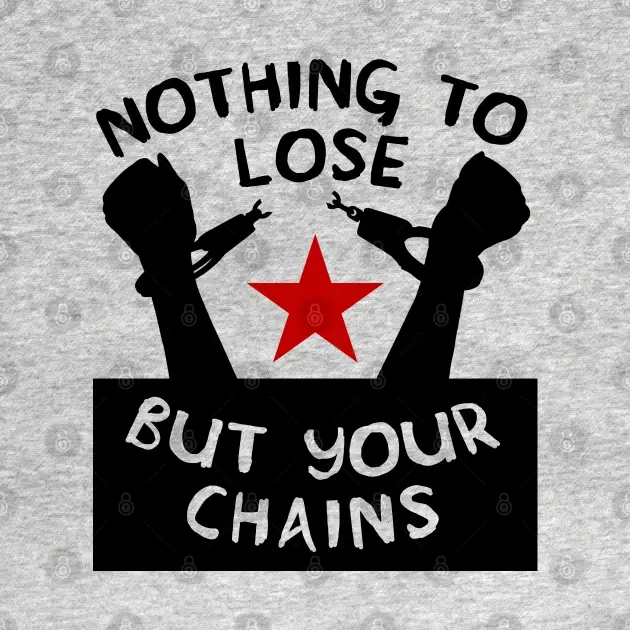I haven’t read Saito’s books, or looked too deeply into degrowth as a movement. I just read this article and thought it made some good arguments against what it claims are Saito’s understandings of Marx. I’m not sure I agree with everything, but I thought it was interesting enough to share.
:fedcobin:

but for real its beside the point whether marx said exactly what saito says he said, the whole world can’t live like average american, having 2 tonnes of metals dug up for personal movement, shoveling yearly consumption of someone in sahel to heat up house leaking shit, and buying new tvs every 5 years. tv should work 20 years, phones should be used for 10 years etc. the fuck it is, except degrowth, degrowth of consumption?
At the same time, what’s the point of talking about degrowth communism when communism is inherently stable and don’t need growth? Is it just rebranding?
I took it that way. Since the slogan is “degrowth communism”, and not “degrowth socialism” I interpret it as what actual communism would look like in regards to production, and so imo it’s pretty redundant
no ur right it’s fine that a seat on a single cross country flight emits more carbon than people in developing countries emit in an entire year and millions of americans take them everywhere continually
I HATE LEIGH PHILLIPS!! He is a right winger! He is a neoclassical economist pretending to be a social democrat pretending to be a socialist! HE ACTUALLY THINKS THERE ARE NO LIMITS TO GROWTH! Absurd! Completely absurd! If we continue to grow our energy use by 2% per year, the oceans will boil from just the waste heat produced in a few hundred years! Just because Malthus was wrong and a piece of shit doesn’t mean there are absolutely zero natural limits on humanity! And if this dude is a right winger - which he is - why the fuck should I presume his interpretation of Marx is correct? I will read Saito’s book eventually and see for myself. But I cannot trust Phillips to be engaging with Saito OR Marx in good faith. This is the guy who got so mad about communists telling him why bananas were cheap that he wrote an article defending private jets (???), not once considering that we should get rid of capitalists (???Marxist???), that EVERYONE should have a private jet (???), and then realized his argument was so bad that actually everyone should have a private jet because hospitals need access to them??? Wow what an incredible mind you have, Leigh Phillips. You are so right! Just like how everyone needs a car so that hospitals have access to them to bring emergency patients in! Except not you IDIOT! THAT’S CALLED A FUCKING AMBULANCE AND EVERYONE HAVING A CAR MEANS MORE TRAFFIC, SLOWER AMBULANCES, AND MORE DEATHS. I HATE LEIGH PHILLIPS!!!
imma be honest I have a hard time giving a shit whether or not some guy I’ve never read misinterpreted marx or not.
What’s obvious to me is that in the near term a lot needs to change about production everywhere and allocation of resources in the global north especially, if we are to slow down/reverse climate change and survive it. Does this imply a permanent limit on production or population? No. But like, it might be a while before we get this shit under control, if we ever do.
In the meantime, reallocating resources does not have to come with a loss of quality of life. If I never flew on a plane again but I had enough time off of work to take a train instead, that would be a net increase in quality of life. If instead of the primary way of getting around for 95% of americans being a car, it was public transit, that would be an improvement, not a decline in QoL. The list goes on. Living slower (in some respects), simpler, less wasteful lives, is not an inherent regression in society, more production isn’t inherently better when the things being produced and the process of production are both fucked and making people’s lives worse.
one of the articles arguments being “well once we have space travel the ecological limits of earth will be irrelevant so there’s no need to stop growth at any time” already disqualifies it.
also hilarious how even the people more sympathetic to de-growth on here imagine it as a world where you just get a new smartphone every 5 years instead of every year. like even imagining a world without them is too much, even though we haven’t even had them for two decades
like even imagining a world without them is too much,
?
To me this has some huge logical jumps and oversights, and some pretty naive assumptions about what degrowth communism actually means. The authors suggestion that degrowth is actually Malthusian is bizarre, since Saito isn’t talking about degrowing the population. Also, saying on the one hand that the global North isn’t relying on the global south, while also talking about how technology is the solution to world equity (as if the materials for technological development aren’t pulled out of mines by exploited South workers) is a big blind spot of the authors.
Good read though thanks for sharing
Yeah, I don’t agree with all the points. And, as I said, I haven’t read the literature on “degrowth” (I do have Saito’s books, haven’t gotten around to it). I was specifically interested in what the writers claimed were Saito’s wrongful reinterpretations of Marx on things like historical materialism, and a new break in his thinking similar to the young and old Marx, etc etc. It’s always so fascinating to me, how Marxists (and other leftists ofc) build such competing and conflicting theories arising from the same foundation, often using the same works.
I haven’t read the article but there was an argument that I put to a small-time content creator who is an unaligned communist that is big on degrowth when they discussed how they hadn’t seen anything from MLs on the necessity of degrowth.
My argument is as follows:
I live in a settler-colonial state that is “post”-industrial. She definitely does. You probably do too.
When the revolution comes, I see the absolute necessity of reindustrialisation of these countries because:
a) Blockades and grey zone warfare prosecuted by reactionary countries making self-reliance a material necessity
b) Even without the issue of economic warfare, a first world post-revolutionary society doesn’t just get to rest on its laurels and be like “Welp, we have socialised the means of production here…” while relying on imports and the imperialist world order to ensure that we still get our cheap treats
c) There is an immense debt that my country owes the people who it colonised. There is another immense debt that it owes to the entire world by participating in imperialism and reaping its benefits. Your country probably has this debt too.
Let’s just imagine that a so-called “service economy” could actually exist after the revolution. (I’m deeply skeptical about this but whatever.) A service economy is built upon the backbone of the worst forms of exploitation in the developing world.
What good are reparations if you’re still exploiting those who you pay reparations to?
What does it even look like - do you turn a profit that is something like hundreds or thousands of times more than what you paid for the products and then return a portion back to those farmers, miners, factory workers etc in the developing world? Is that the model that we’re fighting for? What about the colonised peoples - do we just smile at them and say “We achieved socialism - you’re welcome! 🤗” and that’s the end of it?
I’m not opposed to environmental protection efforts or anything. In fact, I think that if my country’s domestic demand was largely met by its own domestic production, this would necessitate a radical reshaping of things like repairability and the repair industry, replaceability, planned longevity displacing planned obsolescence, and consumption as a whole because when the economic field is equalised it’s simply not going to be viable for people to buy a get a new smartphone every year or two imo.
But I just don’t buy the idea that degrowth is either the answer nor that it’s a viable strategy.
Tbh I’m deeply suspicious of it because I believe that it’s liable to be co-opted by imperialist countries so they can kick away the ladder and maintain their hegemonic position over the rest of the world. It’s probably happening right now idk, I haven’t been following it closely.
Good answer. The story I usually go with involves a can of peaches from Del Monté.
You take that can and you look at it and find “grown in Greece, processed in Singapore” and it ends up all the way here into motherfucking Alaska. Those peaches have traveled the world just to end up on our shelves for a few dollars.
The reality of the resource consumption in the form of logistics of moving those damn peaches is absurd as hell and it would literally make more sense to grow the fuckers down in California or Georgia or some shit and move them around a hell of a shorter distance domestically. Apply this to all the shit that’s been outsourced over the decades within reason, and you’ll have easily millions of jobs for Americans that are less exploitative, paid better, have better working conditions, have better environmental protection standards, etc.
But doing that is unprofitable for the capitalist class because they seek to maximize their profits at the cost of everyone but themselves, therefore the workers themselves must seize the means of production itself so it can reorganize the economy into one that actually works for the workers because it is built by the workers.
there can very obviously be no such thing as a “service economy communist state”. re-industrialization would however be a) impossible, since it couldn’t be done without the exploitation of the resources of the global south b) spell ecological disaster for the planet, since even the current de-industrialized west uses up several times more resources than the earth can provide
Why would socialist reindustrialization necessitate the exploitation of the global south? You can just cut back on the egregious stuff (ooh spooky degrowth…), substitute with the next best thing (transit electrification instead of car electrification for example), develop more sustainable technology that completely replaces the previous unsustainable one (sodium batteries instead of lithium), or at worst work out a mutually beneficial deal with a foreign country (like the GDR and Vietnam with coffee).
I think you are confused about what de-industrialization means.
When we’re talking about de-industrialization/re-industrialization, we’re not just talking about the manufacturing sector, you know. Service economy is part of the industry too, as it contributes to the real sector of the economy, which is defined by the production of real goods and services.
America is de-industrialized not just because of the loss of its manufacturing jobs, but the fact that its economy has been largely eclipsed by the non-productive sector (finance, insurance, real estate, or the FIRE sector as Michael Hudson calls it). These are not service industries because they contribute nothing to the real sector of the economy. The so-called “post-industrial” service economy in the US pales in comparison to the non-productive FIRE sector. (Some of the tech companies are harder to define because their business model relies on rent extraction as well, such as paying for subscriptions for what is essentially the same content over time, just like paying rent for living on a piece of land somebody else owned)
That’s where the danger of de-industrialization lies, because it has transitioned into a rentier economy where rent extraction (unearned income) accounts for much of its economic activity (GDP). If you’re paying 30-40% of your monthly income on rent or mortgage, that money that could have been spent on real goods and services to stimulate the local economy, is now being funneled to the top 0.1% of the country.
And this is bad because the working class is being reduced to debt slaves rather than the proletariat of the 19th to early 20th century industrial capitalism, where their labor was tied to production rather than debt or land. This is also why the revolutionary potential in the Western de-industrialized countries is so low.
Now, can a fully service based economy work for a socialist country? That’s another question, but the answer is probably not, not just because you would have to rely on supply chains that you have no control over (unlike the US with its global institutions that enforce neoliberal free trade order), but because there will always be demand for consumption that drives domestic industrial production within the country if the people get to choose what they want to produce.
Not even gonna read, just gonna make an argument he might’ve made a point on.
If we stop the production of Funko, that’s degrowth.
If we stop the production of H&M and fast fashion, that’s degrowth.
If we stop the production Mountain Dew Baja blast 16oz bottles, that’s degrowth.
If we break up the military industrial complex, that’s degrowth.
If we do anything to slow down production of anything, it is degrowth and restructuring an economy.
Average Jacobin writer thinks we hit the communism and have space colonies and world peace overnight.
if we build quality mass public transport, that’s degrowth
It really never ends.
Providing all homes with a universal refrigerator and interchangeable parts, that a neighborhood mechanic could fix. That would destroy the entire industry of smart refrigerators. That’s degrowth
If we stop the production Mountain Dew Baja blast 16oz bottles, that’s degrowth.
Why even FUCKING LIVE?

He probably wants to see Funko Pop production expand by 2% per year so our ancestors can all own a McMansion with 30,000 of them inside.
Now this is communism!
It is a basic error to believe that workers in the Global North exploit people in the Global South, that there is an “imperial mode of living.” This is just a repetition of long discredited theory of a “labor aristocracy,” the flawed notion that workers in developed countries are paid off by the “superprofits” extracted from lower-paid workers in the developing world.
In fact, there has been a “global class war” of capital against all workers across the planet, and all those workers have much in common and a shared interest in combating capitalist rule. Saito and others do capital’s work by creating hardened geographical wedges dividing the international working class against itself.
Uh no, sweaty, and that’s where your wrong kiddo… this global war’s existence is only but a recent contradiction between workers and capitalists in the Global North… but even then, consider this:
And this is all in aggregate, from around 30 years… (think about it historically in the centuries, the western Industrial Revolution was starting at early 1800s)
You can’t make a global north worker oppose something that his lifestyle depends on his ignorance of… after all, there’s a reason many have been apathetic to their position, if not a few historically turned into petty-bourgeois propetarians or well-supported PMC, with a wee bit stock options and a fat salary…
 .
.Leftists and bad slogans, name a better duo. The non primitivist degrowth people are generally pretty alright but those who take it literally are … scary. Obviously capitalist growth will have to cease, but society needs to be fundamentally reorganized which is going to take a lot of ‘growth’ in the productive forces. Because people conflate capitalist growth with technological development the arguments for degrowth sound asinine and they dismiss them out of hand.
However I just realized the article is cowritten by Leigh Phillips. I guess I shouldn’t be surprised that Jacobin would still publish something of his now but its disappointing nonetheless.
cowritten by Leigh Phillips.
Are they bad?
Meh. Wrote an overrated book about central planning (thesis is that central planning is possible because Walmart and Amazon do it - of course central planning is possible but not for that reason, Phillips kinda misses the point) that spends a chapter devoted to shitting on Stalin.
Well take a gander at his twitter but lets say he’s a fellow traveler of LaRouche. More importantly for this though, degrowth is a bit of a bugbear for him. He complains about it constantly so I wouldn’t believe he’s being honest about his criticism of Saito.
LaRouche
ewww
the good news is we’re not getting any kind of communism
The funny thing about degrowth is that it requires no sponsors or even opponents, because it’s gonna happen regardless, whether “degrowthers” or “growth Marxists” wish it
It’s like someone railing against the so-called pro-hurricane faction, kinda misses the whole point of reality
Degrowth is essentially a strategy of cutting back on energy inputs in order to prevent catastrophic climate change. It simply described a possible pathway to stay below 1.5°C of warming. I use the past tense because we already passed that threshold unfortunately. What you’re calling degrowth is instead that catastrophic climate change will destroy the material basis for our current modern civilization, thus reducing energy inputs (and presumably ending further anthropogenic warming).
So, I think these are quite different. Strategy to avoid apocalypse vs result of apocalypse
Intentional degrowth on terms we make ourselves, versus sudden emergent degrowth from critical existence failure.
Let’s take a peek at the article’s objectivi—
Kohei Saito’s degrowth rewrite of Marxist theory is not only incorrect — if taken seriously, it would lead to political disaster for both the socialist left and the environmental movement.
Oh. Somebody let me know when this isn’t just a slap fight between “Marxists” and “Marxists”.
deleted by creator
deleted by creator
If I click on this article… its not going to use the term “degrowth” correctly, right?
Like, would you even need to have a “degrowth” movement in a communist society? It wouldn’t be “growing” a sector just for the sake of its own growth or increase its production or potential revenue or anything. There wouldn’t need to be a warehouse full of lithium-ion batteries that sits unused for a decade because it was “more profitable/efficient” to run the factory at full capacity long enough to generate a warehouse full of batteries and then turn the factory off… just to have a warehouse full of batteries, not because there was an actual demand for them.
Like, would you even need to have a “degrowth” movement in a communist society?
Very obviously yes? we are already using up much more of the earth than it can take even if we stopped growing today (which we obviously won’t).
sigh
Okay, everything I’ve heard/read about the Degrowth Movement is based around combating the idea of “Infinite Growth that attempts to chase Profits”. What it isn’t, is new way to say, “Malthusian thought was actually correct all along.”
So Degrowth doesn’t say “no more air planes, period” it says, “Why are empty air planes being flown? Why are there 6 or 12 or 20 airlines all providing the same service, each with their own planes and support infrastructure BUT most of the planes, most of the time, are never full of passengers as the limited number of passengers are split up between ALL the airlines?”
During the beginning of the COVID slowdown in the USA there were a few articles about crops being plowed back into the fields with the justification of “there just isn’t any demand for potatoes” or some other such bullshit. COVID didn’t immediately kill half the population of the USA, all that food COULD have just been purchased at “cost plus” and distributed to people who were temporarily furloughed from work. Instead, we get a situation where a bunch of people decided, “Well our profits aren’t going to be as high as we want this year…” and immediately decided to destroy a whole bunch of food that was perfectly good.
I worked at a grocery store a long time ago, and when I first started working there the Grocery manager would tell the buyers, “You need to order enough product to keep the shelves ‘looking full’”. This resulted in a shit ton of overbuying. I was constantly finding things that were past their “sell by date” by months and several times BY YEARS because things would just get shoved to the back of the shelves during restocking instead of being rotated properly due to time/labor constraints. Just the little yogurt cups alone, holy crap! I’d easily chunk 25 pounds of the little fuckers into the trash every two weeks and it wasn’t because nobody was buying the brands or flavors, it was because there’s an idea that customers won’t buy from shelves that look picked over. It took YEARS and a pile of spreadsheet work to convince management that, “Hey, stop scaring the buyers into buying so much shit that just gets thrown away. Its grossly wasteful in so many different ways.”
I have found the first Jacobin article where I don’t want to spit in the face of the author.
Basically what you said in the post’s body paragraph is the opinion I have after reading this with the addition that should what this articles authors claim against Saito in regards to distorting Marx should be the truth, then that is an incredibly damning statement of credibility to Saito’s work.

















